Top 15 Most Well-liked New Year's Poetry That Are Simple to Spread
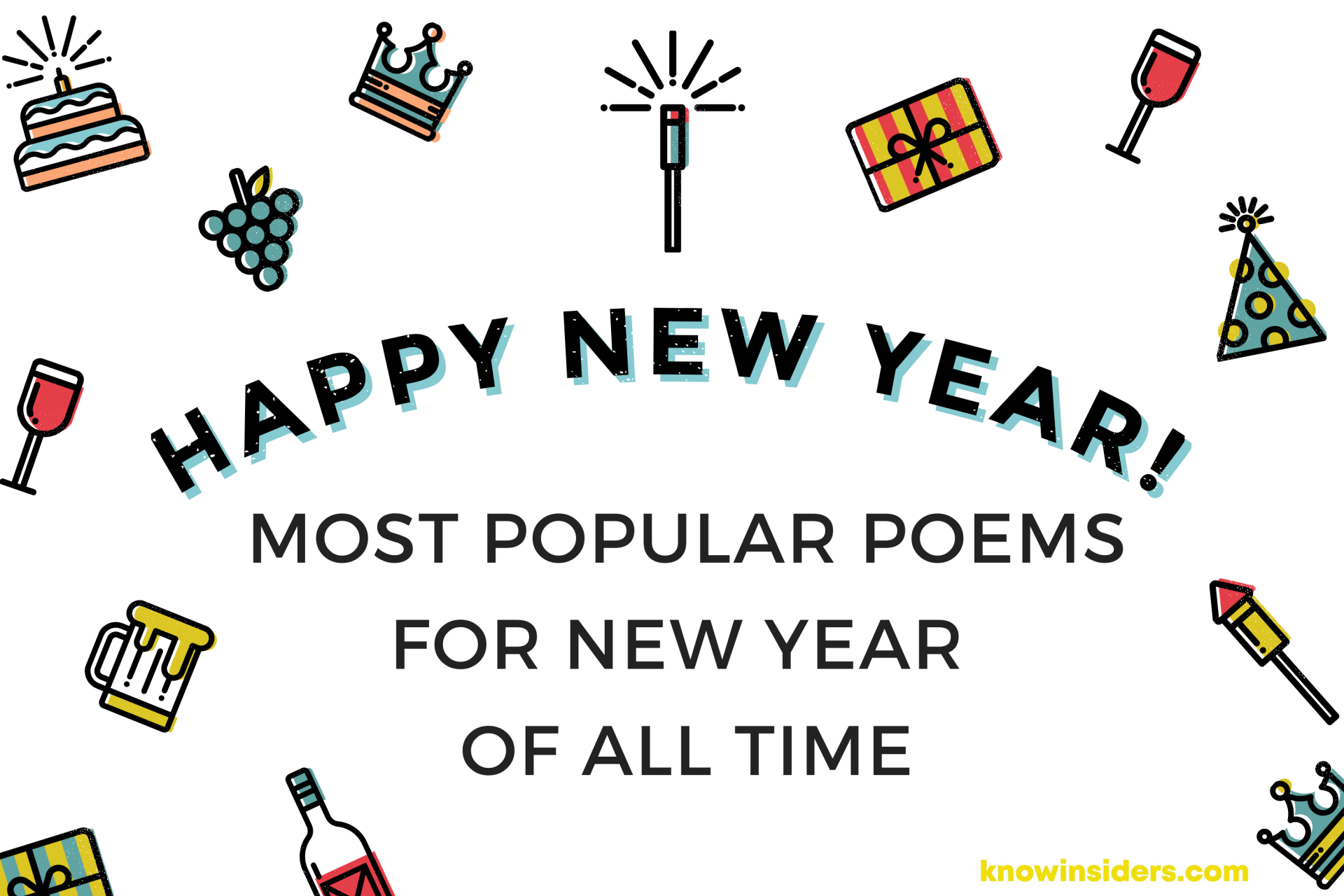 |
| The Most Popular Poems For New Year Of All Time. Photo: KnowInsiders.com |
| Table Content |
Observing the arrival of the New Year is a long-established custom, so it is unsurprising that numerous eminent poets have used the theme of the New Year in their literary compositions. Presented below are the 15 most renowned New Year poetry from various languages, which have gained significant popularity over time.
What are the most popular poems in history?
1. Anonymous, ‘Sir Gawain and the Green Knight’.
Ande þer þay dronken, and dalten, and demed eft nwe
To norne on þe same note on Nwe Ȝerez euen;
Bot þe knyȝt craued leue to kayre on þe morn,
For hit watz neȝ at þe terme þat he to schulde.
Þe lorde hym letted of þat, to lenge hym resteyed,
And sayde, ‘As I am trwe segge, I siker my trawþe
Þou schal cheue to þe grene chapel þy charres to make,
Leude, on Nw Ȝerez lyȝt, longe bifore pryme.
2. Robert Burns, ‘Auld Lang Syne’
Should auld acquaintance be forgot,
And never brought to mind?
Should auld acquaintance be forgot,
And auld lang syne!
For auld lang syne, my dear,
For auld lang syne.
We’ll tak a cup o’ kindness yet,
For auld lang syne.
| It's perhaps unavoidable that this poem (or, more accurately, song) would be included in a list of the best poems for the New Year. Although it is frequently credited to Burns, 'Auld Lang Syne' (i.e. 'old long since' or 'a long time ago') was based on a traditional ballad that Burns wrote down in an effort to preserve his country's traditional oral culture. Because of its popularity at New Year's festivities around the world, 'Auld Lang Syne' is one of the most well-known poems or songs written in English. |
3. The Old Year by Robert BurnsJohn Clare
The Old Year’s gone away
To nothingness and night:
We cannot find him all the day
Nor hear him in the night:
He left no footstep, mark or place
In either shade or sun:
The last year he’d a neighbour’s face,
In this he’s known by none.
4. Ring out, wild bells by Alfred, Lord Tennyson
Ring out, wild bells, to the wild sky,
The flying cloud, the frosty light:
The year is dying in the night;
Ring out, wild bells, and let him die.
Ring out the old, ring in the new,
Ring, happy bells, across the snow:
The year is going, let him go;
Ring out the false, ring in the true…
| This is one of Tennyson's final poems in his great masterpiece, In Memoriam (1850), an elegy for his good friend Arthur Henry Hallam. It's also one of the most beautiful New Year's poems in English language. Tennyson asks the church bells to "ring out the old, ring in the new," ridding the world of the horrible things that have happened and ushering in a better, brighter future. To read the entire poem, click on the link above. |
5. Old and New Year Ditties by Christina Rossetti
New Year met me somewhat sad:
Old Year leaves me tired,
Stripped of favourite things I had
Baulked of much desired:
Yet farther on my road to-day
God willing, farther on my way.
New Year coming on apace
What have you to give me?
Bring you scathe, or bring you grace,
Face me with an honest face;
You shall not deceive me:
Be it good or ill, be it what you will,
It needs shall help me on my road,
My rugged way to heaven, please God…
6. The Darkling Thrush by Thomas Hardy
The land’s sharp features seemed to me
The Century’s corpse outleant,
Its crypt the cloudy canopy,
The wind its death-lament.
The ancient pulse of germ and birth
Was shrunken hard and dry,
And every spirit upon earth
Seemed fervourless as I…
| Written on the last day of 1900, or, if you follow the convention that the twentieth century began in 1901, on the last day of the nineteenth century as well, "The Darkling Thrush" takes a single scene, a moment of wintry wonder, and ponders its meaning as Hardy and the world teeter on the brink of a new year and a new century. To read the entire New Year poetry, click the aforementioned link. |
7. Ring Out, Wild Bells - By Alfred Tennyson
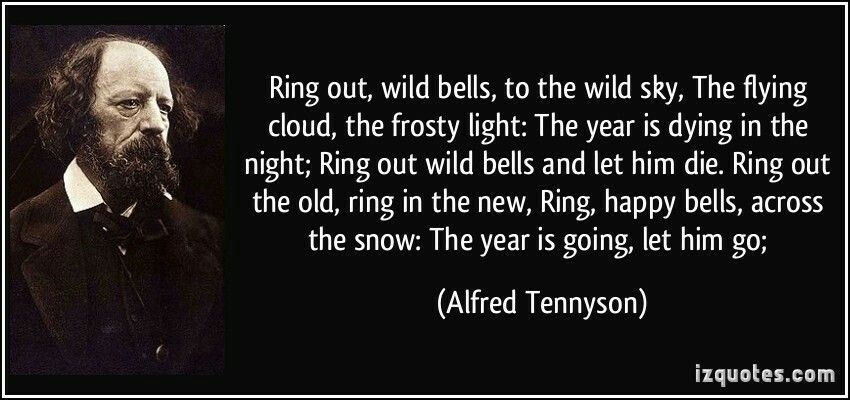 |
| Photo Pinterest |
Ring out, wild bells, to the wild sky,
The flying cloud, the frosty light;
The year is dying in the night;
Ring out, wild bells, and let him die.
Ring out the old, ring in the new,
Ring, happy bells, across the snow:
The year is going, let him go;
Ring out the false, ring in the true.
Ring out the grief that saps the mind,
For those that here we see no more,
Ring out the feud of rich and poor,
Ring in redress to all mankind.
Ring out a slowly dying cause,
And ancient forms of party strife;
Ring in the nobler modes of life,
With sweeter manners, purer laws.
Ring out the want, the care the sin,
The faithless coldness of the times;
Ring out, ring out my mournful rhymes,
But ring the fuller minstrel in.
Ring out false pride in place and blood,
The civic slander and the spite;
Ring in the love of truth and right,
Ring in the common love of good.
Ring out old shapes of foul disease,
Ring out the narrowing lust of gold;
Ring out the thousand wars of old,
Ring in the thousand years of peace.
Ring in the valiant man and free,
The larger heart, the kindlier hand;
Ring out the darkness of the land,
Ring in the Christ that is to be.
8. A Journey To A New Year - By Sumira R. Arain
First day of the New Year.
It's time to shine for a new day.
Forget your past,
Your sorrow, your pain.
New ideas are waiting ahead.
It's time to recall all your memories,
Beautiful dreams that remain uncovered,
Painful parts of life when your heart gets crushed.
But don't be afraid.
The future is in your hand.
Hold it in your hand.
Start your race,
A new journey,
That leads you to success.
You will rise again
You will shine again.
Happy New Year!
9.New Year’s Eve by W. H. Auden young man
The end of the year fell chilly
Between a moon and a moon;
Thorough the twilight shrilly
The bells rang, ringing no tune.
The windows stained with story,
The walls with miracle scored,
Were hidden for gloom and glory
Filling the house of the Lord.
Arch and aisle and rafter
And roof-tree dizzily high
Were full of weeping and laughter
And song and saying good-bye…
| This poem by A. E. Housman (1859–1936) has bells ringing for the New Year, just like in Tennyson's poem above. However, in contrast to Tennyson's poetry, they are "dead knells" and "ringing no tune" here. The poem depicts the dying pains of an antiquated system, including ancient kingdoms, religions, and empires, rather than fresh starts. To read this lengthy New Year's poem in its entirety, click the above link. |
10. A New Year Foretold – By Debra L. Brown
 |
| Photo KnowInsiders |
This New Year has been foretold.
Your future is at hand.
God knows the fate and outcome
of each and every man.
God has chosen the narrow road.
His wisdom is leading the way.
His great strength can carry your load.
His compassion you will feel every day.
With a new dawn over the horizon,
and the Lord to lead the way,
you can spread your wings like an eagle
and soar through every day.
11. Blossom by Dorianne Laux
Say goodbye to disaster
Shake hands
with the unknown,
what becomes
of us once we’ve been torn apart
and returned to our future, naked
and small, sewn back together
scar by scar.
READ MORE: Top 20 Best Poems For Father's Day
12. Burning the old year by Naomi Shihab Nye
Letters swallow themselves in seconds.
Notes friends tied to the doorknob,
transparent scarlet paper,
sizzle like moth wings,
marry the air.
So much of any year is flammable,
lists of vegetables, partial poems.
Orange swirling flame of days,
so little is a stone.
Where there was something and suddenly isn’t,
an absence shouts, celebrates, leaves a space.
I begin again with the smallest numbers.
Quick dance, shuffle of losses and leaves,
only the things I didn’t do
crackle after the blazing dies.
13. Aristotle by Billy Collins
This is the beginning.
Almost anything can happen.
This is where you find
the creation of light, a fish wriggling onto land,
the first word of Paradise Lost on an empty page.
Think of an egg, the letter A,
a woman ironing on a bare stage
as the heavy curtain rises.
This is the very beginning.
The first-person narrator introduces himself,
tells us about his lineage.
The mezzo-soprano stands in the wings.
Here the climbers are studying a map
or pulling on their long woolen socks.
This is early on, years before the Ark, dawn.
The profile of an animal is being smeared
on the wall of a cave,
and you have not yet learned to crawl.
This is the opening, the gambit,
a pawn moving forward an inch.
This is your first night with her,
your first night without her.
This is the first part
where the wheels begin to turn,
where the elevator begins its ascent,
before the doors lurch apart.
This is the middle.
Things have had time to get complicated,
messy, really. Nothing is simple anymore.
Cities have sprouted up along the rivers
teeming with people at cross-purposes—
a million schemes, a million wild looks.
Disappointment unshoulders his knapsack
here and pitches his ragged tent.
This is the sticky part where the plot congeals,
where the action suddenly reverses
or swerves off in an outrageous direction.
Here the narrator devotes a long paragraph
to why Miriam does not want Edward's child.
Someone hides a letter under a pillow.
Here the aria rises to a pitch,
a song of betrayal, salted with revenge.
And the climbing party is stuck on a ledge
halfway up the mountain.
This is the bridge, the painful modulation.
This is the thick of things.
So much is crowded into the middle—
the guitars of Spain, piles of ripe avocados,
Russian uniforms, noisy parties,
lakeside kisses, arguments heard through a wall—
too much to name, too much to think about.
And this is the end,
the car running out of road,
the river losing its name in an ocean,
the long nose of the photographed horse
touching the white electronic line.
This is the colophon, the last elephant in the parade,
the empty wheelchair,
and pigeons floating down in the evening.
Here the stage is littered with bodies,
the narrator leads the characters to their cells,
and the climbers are in their graves.
It is me hitting the period
and you closing the book.
It is Sylvia Plath in the kitchen
and St. Clement with an anchor around his neck.
This is the final bit
thinning away to nothing.
This is the end, according to Aristotle,
what we have all been waiting for,
what everything comes down to,
the destination we cannot help imagining,
a streak of light in the sky,
a hat on a peg, and outside the cabin, falling leaves.
| It's a good idea to consider beginnings, middles, and ends on New Year's Eve, and Collins examines all three in this piece. Billy Collins is arguably one of the most well-known poets in the modern world, having held the position twice as the US Poet Laureate. |
14. I Remember I Remember by Philip Larkin
Coming up England by a different line
For once, early in the cold new year,
We stopped, and, watching men with number plates
Sprint down the platform to familiar gates,
'Why, Coventry!' I exclaimed.
'I was born here.
I leant far out, and squinnied for a sign
That this was still the town that had been 'mine'
So long, but found I wasn't even clear
Which side was which.
From where those cycle-crates
Were standing, had we annually departed
For all those family hols? .
A whistle went:
Things moved.
I sat back, staring at my boots.
'Was that,' my friend smiled, 'where you "have your roots"?'
No, only where my childhood was unspent,
I wanted to retort, just where I started:
By now I've got the whole place clearly charted.
Our garden, first: where I did not invent
Blinding theologies of flowers and fruits,
And wasn't spoken to by an old hat.
And here we have that splendid family
I never ran to when I got depressed,
The boys all biceps and the girls all chest,
Their comic Ford, their farm where I could be
'Really myself'.
I'll show you, come to that,
The bracken where I never trembling sat,
Determined to go through with it; where she
Lay back, and 'all became a burning mist'.
And, in those offices, my doggerel
Was not set up in blunt ten-point, nor read
By a distinguished cousin of the mayor,
Who didn't call and tell my father There
Before us, had we the gift to see ahead -
'You look as though you wished the place in Hell,'
My friend said, 'judging from your face.
' 'Oh well,
I suppose it's not the place's fault,' I said.
'Nothing, like something, happens anywhere.
15. Seasons Yet To Come by Rick W. Cotton
They gave us all a calendar
At work this afternoon.
Suddenly it dawns on me,
The year is ending soon!
Comes January, cold and gray.
The new year's just beginning.
And February, short and bright
With Valentine hearts winning.
Comes March, the windy roaring one
And warm the sun of spring.
Then April, bright of shining sky
And flowers blossoming.
Comes May, and school comes to a close
With children's happy laughter.
Then June, with open city pools
And picnics soon thereafter.
July comes booming with a bang
Of red-glared rockets blasting.
Then August lingers with its heat
That seems so...everlasting.
September, gold September comes.
The year is growing older.
October with sweet Halloween.
The nights grow dark and colder.
November smells of harvest,
Of turkey and Thanksgiving.
December comes with joy and light
To fill hearts of the living.
Each page I flip and see these things
Of days yet to come.
My calendar is a door to me,
An adventure just begun!
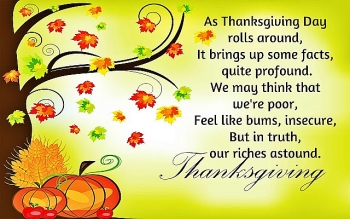 Top 25 Most Popular Poems for Thanksgiving Of All Time Top 25 Most Popular Poems for Thanksgiving Of All Time Check out the best Thanksgiving poems which can for devoting mother, father, parents, relative and to God. Take a moment to celebrate gratitude with these ... |
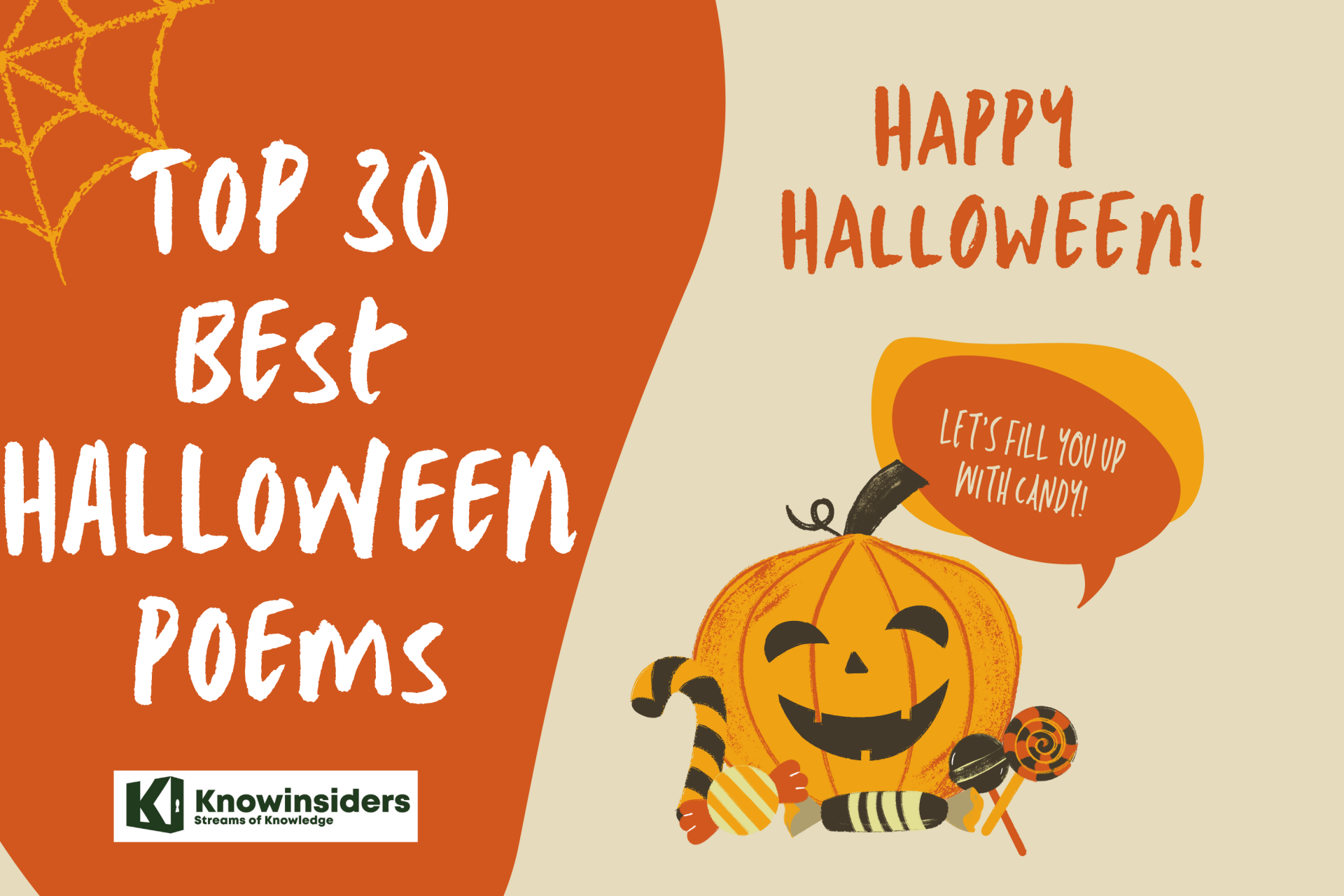 Top 30 Best Halloween Poems Of All Time Top 30 Best Halloween Poems Of All Time Scary Trick or Treat Poems for Halloween. If you are looking for some good poems on Halloween, you’ve come at the right place. |
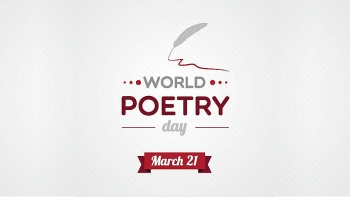 World Poetry Day (March 21): Date, History, Significance & How to celebrate World Poetry Day (March 21): Date, History, Significance & How to celebrate Poetry can change the way people view the world and inspire our flow of ideas. If you're a poetry lover, don't forget the World Poetry ... |



























